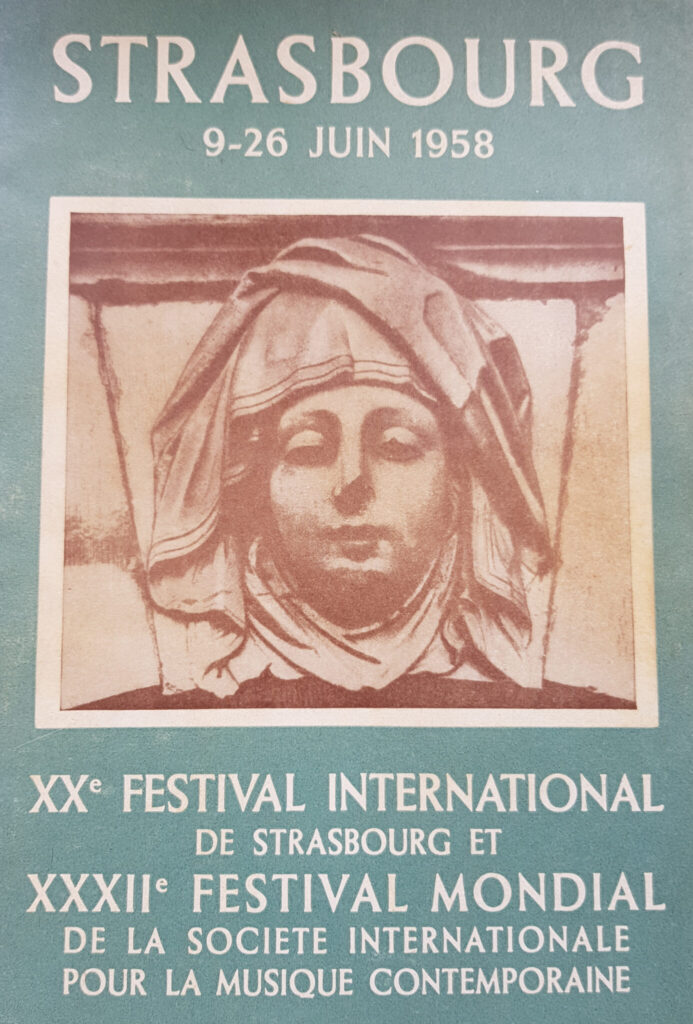Organized by the Societe des Amis de la Musique and the city and in connection with the 20th Festival International de Strasbourg with most concerts likely taking place at the Palais des Fêtes.

From contemporaneous reviews
“[A] week of bad modern music was no more than a slight irritation, even for those who faithfully listened to it night after night. Asked to guess the meaning of I.S.C.M. a sane outsider, observing the faces and interval talk of the same few hundred people who gathered for the concerts each day, might have proposed Incredibly Silly Coterie of Masochists.”
–Colin Mason, “Contemporary Music at Strasbourg,”
The Guardian (Manchester), 20 June 1958, p. 7.
“[T]here was little in the nature of its programs to attract an international public. … Most of the music performed was ‘serial music,’ not all of it purely dodecaphonic, though… [M]any young composers seem to be so delighted with the technical tricks possible (but not necessary) in serial music that their compositions have nothing but technical interest. One visitor mockingly said I.S.C.M. stands for International Series Computing Machine.”
–Peter Gradenwitz, “Modern Scores from 17 Nations: Strasbourg Plays Host To Recently Ended I. S. C. M. Festival,”
The New York Times, June 29, 1958, Section X, p. 9
“Voor het eerst sedert 1937 organiseerde de Franse sektie van de I.S.C.M. het jaarlijkse festival van hedendaagse muziek, dat thans te Straatsburg plaatsvindt. Zij werd daartoe gesteund door de Franse staat en door het stadsbestuur. De organisatie is voortreffelijk en de vele practische diensten waarmede de gemeente Straatsburg haar gastvrijheid in daden toont, is boven alle lof verheven. …
“Reeds de eerste twee festivalconcerten, respectievelijk aan kamermuziek en aan orkestwerken gewijd, confronteerden hen die actief of zijdelings betrokken zijn bij de grote omwenteling welke zich allerwegen in de scheppende toonkunst aan het voltrekken is, met alle toekomstverwachtingen, maar ook met alle problemen die aan elke omwenteling eigen zijn. Met die omwenteling wordt de enorme vlucht bedoeld die de reeksentechniek in een integrale chromatische twaalftonige ordening van het klankmateriaal genomen heeft. Blijkens de eerste twee concerten en de op de volgende programma’s aangekondigde werken, zal ook dit 32ste Festival der I.S.C.M. zijn betekenis vooral ontlenen aan de vele mogelijkheden die het biedt om zowel individueel onderscheidene dodecafonische componeertechnieken onderling met elkaar te vergelijken, als ook om deze te vergelijken met compositorische structuren die niet volgens dodecafonische principes tot stand zijn gekomen. Het is namelijk een boeiende en verheugende toedracht dat de creatieve geest, zelfs wanneer hij zich zo gaarne in de bunkers van dogmatiek verschanst als de dodecafonie dat van haar adepten schijnt te eisen, zich toch weinig stoort aan de Pruissische commandotoon van de opperpriesters der Duits-orthodoxe dodecafonische kerk, Herbert Eimert en Karlheinz Stockhausen, en overtuigend aantoont dat de reeksen-techniek vele persoonlijke variaties toelaat.
(“For the first time since 1937, the French section of the I.S.C.M. is hosting the annual festival of contemporary music which is now taking place in Strasbourg. To this end, it was supported by the French state and the city council. The organization is excellent and the many practical services with which the municipality of Strasbourg shows its hospitality in deeds is beyond praise. …
“Already the first two festival concerts, devoted respectively to chamber music and to orchestral works, confronted those who are actively or indirectly involved in the great revolution that is taking place in all kinds of creative music, with all the expectations of the future, but also with all the problems inherent in any revolution. This revolution refers to the enormous flight that the serial technique has taken in an integral chromatic twelve-tone arrangement of the sound material. According to the first two concerts and the works announced on the following programs, this 32nd Festival of the I.S.C.M., its significance is mainly due to the many possibilities it offers to compare individually distinct dodecaphonic composition techniques with each other, and also to compare these with compositional structures that were not created according to dodecaphonic principles. It is indeed a fascinating and gratifying circumstance that the creative spirit, even when it so readily entrenches itself in the bunkers of dogmatism as dodecaphony seems to demand of its adepts, is nevertheless little disturbed by the Prussian command tone of the high priests of the German Orthodox dodecaphonic church, Herbert Eimert and Karlheinz Stockhausen, and convincingly demonstrates that the serial technique allows for many personal variations.”)
— Rudolf Escher, “Oprechtheid en gestroomlijnde krachtpatserij op 32e festival Straatsburg, juni”
(“Sincerity and streamlined powerhouse at the 32nd festival Strasbourg in June”),
Algemeen Handelsblad, 14 June 1958 [in Dutch].
